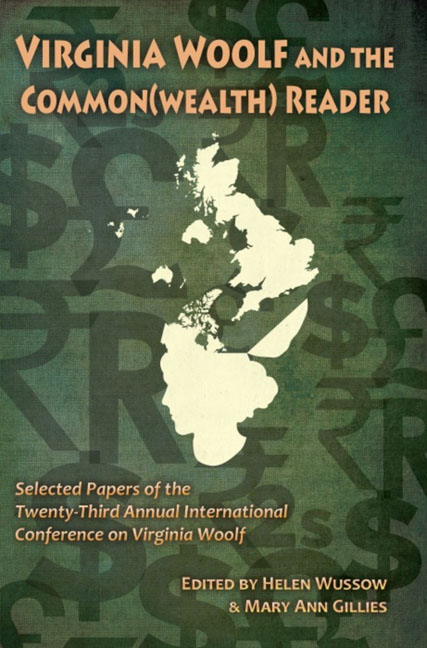Book contents
- Frontmatter
- Contents
- Introduction to Virginia Woolf and the Common(wealth) Reader
- Acknowledgments
- List of Abbreviations
- Invocations
- Networks of Affiliation: Foundations and Friends
- Woolf and the Commonwealth
- 1930s Onwards
- War, Peace, Internationalism: Bloomsbury Legacies
- “Caterpillars of the Commonwealth Unite”: Photography and Trauma in Three Guineas
- “Drawn from Our Island History”: Virginia Woolf, Nancy Mitford, and the Politics of Pageantry
- A ”Bloodless and Pernicious Pest”: The Middlebrow's “Common Man” in the Essays of Virginia Woolf
- Woolf's Troubled and Troubling Relationship to Race: The Long Reach of the White Arm of Imperialism
- Woolfian Seamarks: Commodified Women and the Racial Other on the Shores of Empire
- Documenting Fascism in Three Guineas and The Handmaid's Tale: An Examination of Woolf's Textual Notes and Scrapbooks and Atwood's “Historical Notes”
- Proportion, Conversion, Transition: War Trauma and Sites of Healing in Virginia Woolf's Mrs. Dalloway and Leslie Marmon Silko's Ceremony
- Woolf Beyond the Book
- Notes on Contributors
- Conference Program
War, Peace, Internationalism: Bloomsbury Legacies
from 1930s Onwards
- Frontmatter
- Contents
- Introduction to Virginia Woolf and the Common(wealth) Reader
- Acknowledgments
- List of Abbreviations
- Invocations
- Networks of Affiliation: Foundations and Friends
- Woolf and the Commonwealth
- 1930s Onwards
- War, Peace, Internationalism: Bloomsbury Legacies
- “Caterpillars of the Commonwealth Unite”: Photography and Trauma in Three Guineas
- “Drawn from Our Island History”: Virginia Woolf, Nancy Mitford, and the Politics of Pageantry
- A ”Bloodless and Pernicious Pest”: The Middlebrow's “Common Man” in the Essays of Virginia Woolf
- Woolf's Troubled and Troubling Relationship to Race: The Long Reach of the White Arm of Imperialism
- Woolfian Seamarks: Commodified Women and the Racial Other on the Shores of Empire
- Documenting Fascism in Three Guineas and The Handmaid's Tale: An Examination of Woolf's Textual Notes and Scrapbooks and Atwood's “Historical Notes”
- Proportion, Conversion, Transition: War Trauma and Sites of Healing in Virginia Woolf's Mrs. Dalloway and Leslie Marmon Silko's Ceremony
- Woolf Beyond the Book
- Notes on Contributors
- Conference Program
Summary
Military tribunal representative: “Are you doing work of national importance?” Socialist militant: “I'm engaged on work of international importance.”
—Socialist, October 1916 (cited in Hochschild 191, 396)In the relative calm before the Great War, the Cambridge historian and Apostle Goldsworthy Lowes Dickinson—Goldie to his Bloomsbury friends—wrote what his biographer E. M. Forster judged “an excellent verse play”: “War and Peace: A Dramatic Fantasia” (Goldsworthy 178). In 1917 Roger Fry's avowedly internationalist Omega Club, whose members included Clive Bell, Lytton Strachey, W. B. Yeats, Arnold Bennett, and George Bernard Shaw, staged the play's Prologue with Winifred Gill's handmade marionettes as a benefit for Belgian war refugees. The war-extolling Italian Futurist and protofascist F. T. Marinetti had roared in and out of London several times between 1910 and early 1914 to “hurl…against the stars” his defi ant creed that art, like life, “can be nothing but violence, cruelty, and injustice” (16). To Marinetti's avant-garde celebration of technological violence fed “on fi re, on hatred, and on speed”—“We wish to glorify war—the sole cleanser of the world—militarism, patriotism, the destructive act of the libertarian, beautiful ideas worth dying for, and scorn for woman”—Dickinson opposed an allegorical fantasia that pits Futurist ideology against the opposing goal of Peace (16, 14).
Featuring Saxon Sydney-Turner double-cast as War and St. Peter, James Strachey as Violence and Reason, Lytton Strachey as Futurist and Cynic, and “Winnie” (or her marionette) as Peace, Goldie's post-Nietzschean, proto-Brechtian morality play begins with Violence and Futurist—who are, the stage directions specify, “almost indistinguishable”—tumbling out of an aeroplane at heaven's gate and waking Peter up (“WP” 2). Peter explains how things are in heaven: there's always been “no end of friction” between the war-mongering Father and his peace-loving Son; now they've reached an “impasse” and both have vacated the premises, leaving Peter to guard War and Peace (“WP” 5-6). Violence and Futurist “dance menacingly around” Peter “in boxing attitudes” till he surrenders War (10). As Futurist gloats, “Didn't you see me animalise the man, / Vegetalise, electrify, and magnetise?…His hair was a battery, his eyes / Electric sparks” (10).
- Type
- Chapter
- Information
- Virginia Woolf and the Common(wealth) Reader , pp. 128 - 144Publisher: Liverpool University PressPrint publication year: 2014

